- Home
- Ann Patchett
Truth & Beauty: A Friendship Page 4
Truth & Beauty: A Friendship Read online
Page 4
We were all silent. I didn’t know whether or not I should apologize, since I was sure I wouldn’t have picked him up either.
“You got to stop for people,” he said, punctuating every word. “That’s what you owe me for this ride. You have to pick somebody else up. Do you understand me? Pick them up no matter what they look like.”
Chapter Three
WHEN LUCY WAS FOUR, HER FAMILY CAME TO America from Dublin with her two sisters and two brothers. Her father had been one of the first television journalists in Ireland and his popularity there had landed him a good job with a major network in New York. Lucy’s father died of pancreatitis when she was fourteen, and she kept a black-and-white photograph of him on the wall in the living room. He was wearing a trench coat and smoking a cigarette and he looked straight ahead at the camera. He managed to cut a figure that was at once both dashing and endearing. His eyes were Lucy’s eyes. She was in no way sentimental about her family, but the picture was there like a soft spot.
Grief isn’t something to ‘be gotten through.’ It has no life of its own like that, it’s just plain and simply there. It’s one of the things which tells us we’re human. It’s funny, but I’m always forgetting I had cancer. It seems like a different person that happened to. I can never relate what I’m going through now with cancer either, even though it is the only reason I am here, in aberdeen. Lately the past haunts me a lot. It seems a day does not go by in which I do not remember the chemotherapy, even though once again it oddly doesn’t seem to be connected with cancer. I guess I just never really accepted having it, never thought about it. I look back on that part of my life and I was in a continual state of despair, yet I remember it the same way you would remember any objective detail. I wore a red dress. I was in a state of despair. It wasn’t me at all.
It’s much the same with my father. Like the chemo he comes back to haunt me all the time, but it’s often a detached sort of haunting. Or it is very emotional, very joyous. That might sound odd, but often I feel better able to live and love life through remembering my father. James Tate has a wonderful poem about his father called “The Lost Pilot” (also the name of the book); have you ever read it? It’s about the advantages (I don’t mean to be crude, using that word) of his father’s early death, how now as an adult he realizes his father would already be dead, or very old and decrepit. I have a very pure image of my own father, one that is almost a myth. It has more to do with me than with him.
When she got a call from a film producer in Ireland who had been a friend of her father’s, she was very pleased. It was someone who knew him back in the days before they moved, back in the days that Lucy didn’t exactly remember herself but believed marked a better time in the history of the Grealy clan. The producer knew about her story, the cancer, the surgeries, and he wanted to come to Iowa with a film crew to tape a short documentary about her life, the life of a twenty-two-year-old Irish girl who had overcome insurmountable odds.
“Are you serious?” I said.
“They told me the theme was ‘The Triumph of the Human Spirit.’ ”
“That’s you all right.”
“The Triumph of the Human Spirit.” She leaned forward and put her head against her skinny arms. “Oh my God, what have I done?”
Lucy didn’t want to be known for her face. She wanted to be known for her poetry, for her ideas. Still, there was part of her that looked forward to the film crew. She liked the attention, she liked the fact that they were coming from Ireland. She liked the thought of meeting someone who knew her father.
The film crew, when they arrived, consisted of three overly large men with cameras and bags and lights packed into a small rental car. When they unpacked their gear, it was impossible to imagine they could have squeezed such an enormous amount of flesh and equipment into such a tiny space or how they would ever cram it all back in again. They were driving around the States putting together as many stories as they could find before going home. They stood awkwardly in our living room, which contained a single chair and a tiny foam-rubber love seat that was completely unsuitable for anyone weighing more than 130 pounds. The producer looked at the picture on the wall and tapped the frame. “Ah, your dad was a great guy,” he said. That was all. Even I was hoping for something more. They were all looking hard at Lucy, not just her face, but all of her. Would she be enough to fill up a television screen?
“Come ride around with us,” the producer said. “Show us the sights.”
“There aren’t a lot of sights,” Lucy said, but they all piled in the car and drove away. I waved to them from the door, a worried mother sending her daughter off to the prom with three dates.
When she came home late that night, she was quiet and tired. She’d had dinner with the film crew and a couple of beers and then they dropped her off on Governor Street and drove away.
“So,” I said. “Are you going to be a movie star?”
Lucy left her coat in a pile on the floor. She fell down on the couch and put her head in my lap. “I couldn’t do it.”
I brushed back her hair with my fingers and asked her why not.
“Oh, it was the whole Triumph of the Human Spirit thing. Every time they talked about it, I couldn’t stop laughing. It doesn’t matter. I don’t think they wanted me anyway. I don’t think I was what they had in mind.”
I couldn’t tell whether or not she felt bad about it, and I don’t think she could tell either. It would be nice to be on television in Ireland, but not because of her face.
A few days later I went along with her to a lecture Jim Galvin was giving on Faulkner and in the middle of the class I tore a corner off a piece of paper, printed the word TRIUMPH, and slipped it over to Lucy. When she read it, she started to sputter a little, then giggle. She tamped it down for a minute or two, but then it came back. At first she had a hold of it, but then it got out of hand, a little kitchen fire that suddenly rears back and swallows the house whole. The laughter was bigger than she was and there was simply no fighting it. By now the class had stopped, Galvin stopped, and we watched her as she choked and wept and laughed. “I’m sorry,” she said, but she could barely make the words. She pulled her books together and left the room. I followed her. She tried to berate me but she couldn’t stop laughing.
LUCY, NOT A TELEVISION STAR, occasionally a triumph, went back to work on her poetry, leaving drafts around the house the same way she left her scattered clothes. She gave me xeroxed copies of the poems she read and loved. She ripped pages out of literary magazines and taped them to the refrigerator. Poetry defined her, saved her. There were times it seemed to be the only thing around that made perfect sense.
I’m getting really dependent on art, ann. That might sound pretentious, and it might very well be due to the fact that I’m in the midst of a bit of an emotional abyss at the moment, but it seems to be the only place I find any meaning. But the amazing thing, the most extraordinary thing to me, is that this meaning I find is itself totally undefinable. Just now this is especially true with painting. I’ve always in the past been a bit hot and cold about contemporary painting, yet in the last year or so it’s begun to have a real effect on me. Painting styles I would have scoffed at before can now grab my attention and give me a real sense of…importance? (Not my own, theirs). I bought this giant book of contemporary american and german painting at a big discount, and I’m loving it. It makes me wish I were a painter. But poetry too, that’s been really important to me lately, redefined, as it were. I could never stand John Ashbery before, but now I’m reading things of his which I love (though admittedly I still have great trouble with the bulk of his work). The whole point I’m trying to work up to is that I think, I am sure, that this new importance poetry and art in general is having for me has to do a great deal with my precarious emotional state. Does this raise or lower, then, the everyday importance of art? Does something which exists on the edge have no true relevance to the stable center, or does it, by being on the edge, become a part of the edge and t
hus a part of the boundary, the definition which gives the whole its shape? I would like to believe it is the latter, but does wanting to believe in something make that something valid? (Didn’t they used to use this argument for the existence of god back in the olden days?)
Had we managed to keep our lives focused on art, I think we would have lived in a state of brilliant happiness, but no one can stand in front of a painting forever. By the spring I was dating a fiction writer who was in love with another woman who had recently dropped him. He was very sad and would clearly benefit from my enthusiastic bol-stering. It wasn’t a good relationship, but at least I could now contribute to the morning’s discussions of sex. Lucy kept on with B——, but they broke apart and came back together so many times they were like a plate that had been dropped on the floor repeatedly: more glue than china. Lucy tried to get out of it, but she could never quite bring herself to believe that B——wasn’t better than nothing at all.
“He’s insane,” she said. “Everything he says is insane, it’s absolutely clear and I’m sure of it, but then he’ll say one little thing that is so completely true that it undoes me. The true thing catches you off guard, and then everything starts to unravel, and you think about all the insane things he said and you start to wonder if maybe they were true too and maybe you just didn’t want to believe it. That’s what he’s always telling me anyway, that I didn’t believe the rest of it because I couldn’t face the truth.”
She told me the truth according to B——was that she was always going to be alone, that no one would ever love her, and it wasn’t because of the way she looked, it was because of who she was as a person.
Like any sensible friend, I told her not to listen. “The point isn’t to hear it and then reject it. The point is to cross to the other side of the street when you see him coming.” I told her what my father always said: if you don’t want to engage with someone, don’t engage with them, ever, on any level, and they will go away. But she was so hungry for attention and interpretation she would take it wherever she could get it. Lucy read her horoscopes studiously. She threw pennies on the kitchen floor and asked the I Ching for solid advice about her life.
One day B——came and sat down with me at the Great Midwestern Ice Cream Company, the store from which he had brought us quarts of blueberry ice cream in the early days of his courtship with Lucy. He asked me how I was doing. I was doing okay. He and Lucy hadn’t seen each other for a week or two at this particular point and I knew what she would want: she would want me to sit and listen. She would want me to go on a fact-finding mission. While B——and I had been in the same room on many occasions, we had always been with Lucy, and I was curious to see what he would say if we were alone. I thought I could figure him out, break the code. I would take some necessary piece of information back to Lucy that would show her she should ditch this guy once and for all.
If B——had been an actor, he would have been cast in the role of the handsome lobsterman. He had a straight nose and straight sandy brown hair. He was slim and well exercised and his convertible had left him with a casual glow of health, a little pink on top of his tan. He asked me how my work was going. He said that Lucy had told him I was dating someone. “Don’t let it get in the way of your writing,” he said. “That’s the most important thing. That’s the reason why you’re here.” B——had been a student at the Writers’ Workshop years before and he gave off the easy confidence of someone who had the inside track. He wanted to know how much I had written. Did I work every day? “It’s got to be every day,” he said. “If you don’t turn out pages every day, you’re not really a writer. You’re just playing at it. You’re wasting your time.”
I didn’t want to talk about me. I wanted to know what he had to say about my friend. I was not the topic of conversation.
“Oh, but you are,” B——said, as I took another nervous bite of ice cream. “If you’re interested in being a writer, if you’re for real. But you won’t be for real if you don’t write the pages. Then you’re just like everybody else. A lot of talk and nothing ever gets done. All promise, no delivery, am I right?”
“I write,” I said.
“Sure you do. Everyone does. You have some little story in your head that you’re going to get around to. This town is full of those people. I see them come in wanting to be writers and winding up as waitresses. The Workshop practically manufactures waitresses. What makes you think you’re going to be different from anybody else? Are you different? Are you special?”
“I’m not special.” What were we talking about?
“It’s hard to say.” He wagged his finger at me. “But it doesn’t sound like you’re doing the work. That guy you’re seeing, he’ll figure you out, too, then he’ll drop you, because he’ll know that you’re not ever going to be the thing you say you’re going to be, because you don’t do anything, you aren’t anything. You aren’t the girl with all the promise, the girl who’s going to be the real writer. He’ll see that you’re nothing, you’re just something to fuck. Then he’ll drop you, too.”
At some point I stood up and walked out into daylight, leaving my ice cream there to melt on the table. I felt panicked, not that B——would follow me, but that what he said would follow me, that his words had somehow attached themselves to me and were working their way into my clothing, burrowing down towards my skin like nettles. At twenty-two I felt like I had just received the worst tarot card reading in the world and I hadn’t even asked for it. What if he was right? What if I was nothing? What if someone else had seen it?
When I got home I told Lucy everything, and she loved it. It gave her real comfort to know that I had seen him the way she saw him, and that it had scared me half to death.
B——BERATED LUCY for her lack of sexual experience. He wanted her to sleep with other men, and so she did, half to get away from him and half in hopes of getting him back. Seduction was a quest, a skill, and a full-time job. The question was never whether or not Lucy wanted the man, the question was only whether or not the man wanted her. It was her truest hope that everybody wanted her. She had affairs with other students in the program, students outside the program, and one of the undergraduates in her literature class. In the course of a year she had gone from believing that she would die a virgin to thinking there was lost time to make up for. What she wanted was love, and the best way to go looking for it was through sex.
But it never worked that way, and the sex just made her lonelier. I understood that, as it had made me lonelier too. I couldn’t ever remember being lonely before, certainly not in this way, until I had seen the edge of all the ways you could be with another person, which brought up all the myriad ways that person could never be there for you.
A FEW WEEKS later we went to see Peggy Sue Got Married at the mall downtown. Lucy and I were shameless about movies. We would see almost anything that allowed us to sit in the dark air-conditioning of a theater. The night had been fine when we went in, but now it was late and the rain was beating down in dark curtains. We sprinted across the street to a sports bar and took up a little table in the back, ordering drinks while we blotted our hair with thick stacks of paper napkins. There was some game playing on the ten television sets that hung down from the ceiling of the bar, and though there were very few women in the room, no one noticed us at all.
“My God, that was a bad movie,” I said. “Nicolas Cage. What was he thinking?”
“I didn’t hate it,” Lucy said.
“Really?” I was going to tease her, but suddenly she was crying. “What is it?” I said quietly. We could have both sobbed out the darkest corners of our grief and no one in that bar would have known.
“They were together,” she said. “It wasn’t perfect, but they were together.”
“Pet, it was a very stupid movie.”
“I am always going to be alone,” she said. Her hair was still wet. Her cheeks were wet. “I am never going to find someone.”
“You’re going to find someone.”<
br />
“You don’t understand.” She folded her arms on top of the small table and put her head down to cry.
Lucy tried constantly to find and fully participate in any joy that was available to her, but still she was pulled into scorching bouts of depression. Her grief about feeling ugly and her desire to be loved in a way that would be huge enough to meet her needs would regularly roll her into a little ball and paralyze her. She would cry for hours and then for days. Lucy’s sadness terrified me, in large part because it made such perfect sense. No matter how anyone argued for the virtues of her talent and her friendships, the many jewels of her life, there was no denying the fact that what she had been through and what was still ahead of her seemed insurmountable. The damage to her face was a fact, but over the years she had cemented that fact to the idea that she was unlovable. She would tell me that she would give it until winter, then she would go out to the cornfields wearing a light jacket at night, drink a bottle of whiskey, and lie down in the snow.
I put down my head as well and she turned to show me her wet blue eyes. “Listen to me. You will find someone. You always find people. You haven’t found the right one yet, but no one has. You aren’t going to be alone. You’re going to have me.”
A unified roar went up in the bar. A necessary point scored by the favored team, I could only assume. I put my hand on Lucy’s back and felt her uneven breaths, the tremor of her shoulder blades. I was stunned by the rawness of her pain. I came to understand that night in the sports bar, safe from the blinding rain, that I could not worry about Lucy anymore. I knew then it was just too enormous for me to manage and that worrying about her would swamp me. If I was swamped by worry, I would be useless to her. It was even possible that I would desert her, and that was the thing that could never happen. I decided that night I would take all the hours of my life that could so easily be spent worrying and instead I would try to help her. I had been raised by Catholic nuns who told us in no uncertain terms that work was the path to God, and that while it was a fine thing to feel loyalty and devotion in your heart, it would be much better for everyone involved if you could find the physical manifestations of your good thoughts and see them put into action. The world is saved through deeds, not prayer, because what is prayer but a kind of worry? I decided then that my love for Lucy would have to manifest in deeds.

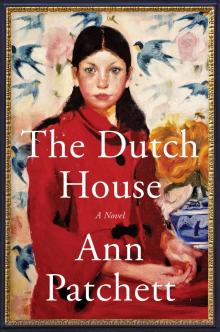 The Dutch House
The Dutch House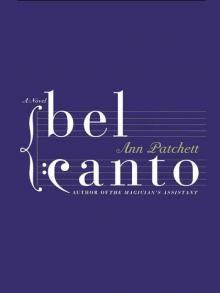 Bel Canto
Bel Canto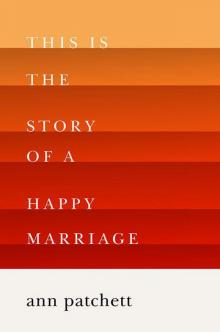 This Is the Story of a Happy Marriage
This Is the Story of a Happy Marriage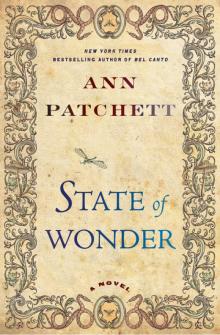 State of Wonder
State of Wonder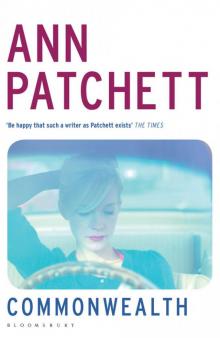 Commonwealth
Commonwealth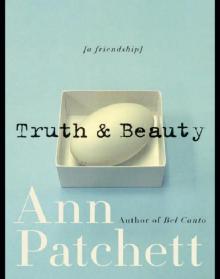 Truth & Beauty: A Friendship
Truth & Beauty: A Friendship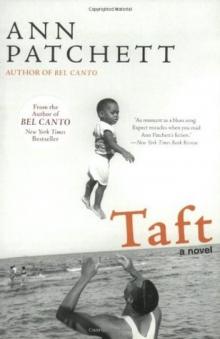 Taft
Taft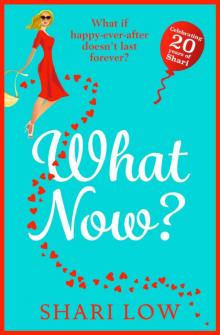 What Now?
What Now?